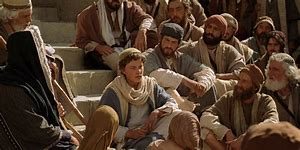Who is Responsible for Education? … continued
Some evidence exists in the Bible for community-based education. In New Testament times, higher education was available at a “house of study.” Such a school was attached to the Jerusalem Temple, and it was perhaps here that Jesus was found when twelve years old (Luke 2:41–52). Jesus would have gone to a house of the book at Nazareth when he was about six years old, sitting as part of a semicircle on the floor, facing the teacher. The only textbook was the Old Testament (2 Timothy 3:15).  The traditional law was taught from the age of ten to the age of fifteen, and Jewish law beyond that. The brightest of the boys could go to Jerusalem to one of the law schools. Paul apparently participated in such training. He states that he had been brought up “at the feet of Gamaliel,” a respected Rabbi in Jerusalem, where he was taught “the law of the fathers” (Acts 22:3).
The traditional law was taught from the age of ten to the age of fifteen, and Jewish law beyond that. The brightest of the boys could go to Jerusalem to one of the law schools. Paul apparently participated in such training. He states that he had been brought up “at the feet of Gamaliel,” a respected Rabbi in Jerusalem, where he was taught “the law of the fathers” (Acts 22:3).
A version of this in our context may look like: a church-organised educational co-operative, where the children of church members (or others who are known and admitted) gather to supplement their homeschool, Christian school or public school education.  Co-ops are the seed-form for thoroughly Christian schools operating out of churches.
Co-ops are the seed-form for thoroughly Christian schools operating out of churches.
The leaders within the local church are responsible for the education of the membership. Our Lord’s parting command was that his disciples evangelize the world and teach believers (Matt 28:19-20). One of the central activities of any church is teaching (Acts 2:42). One of the specific qualifications for a pastor is being “apt to teach” (1 Tim 3:2; Titus 1:9). Mature believers ought to teach those new to the faith (Titus 2:1-3), and some will eventually mature to become teachers for the next generation (2 Tim 2:2; Heb 5:12).
Of course, the primary curriculum in a church context is the Bible. But the study of Scripture provides a foundation for the study of every academic discipline and a guide to every area of life. Many topics of interest relate to the Christian life, so the teaching at church should be broad enough to encompass a wide variety of subjects.
Formal education in a university, college or tech school provides information and skills required for success on many levels. Instruction in the humanities (history, art, politics, language, philosophy, etc) is helpful in developing well-rounded, thoughtful, informed citizens.
Educational Methodology
The Bible is not an education textbook, but it does give us some helpful examples showing us how to teach  effectively. Some biblical methods: Verbal instruction/lecture, Small groups, Mentoring/apprenticeship, Question and answer, Stories, Historic events, Sermons, Songs/poems.
effectively. Some biblical methods: Verbal instruction/lecture, Small groups, Mentoring/apprenticeship, Question and answer, Stories, Historic events, Sermons, Songs/poems.
Curriculum Guidelines/Requirements: A Christian worldview demands that the Bible be a central emphasis in education. Flowing out of this, Christian education focuses on five things:
- Knowledge, understanding, wisdom
- Languages
- History – the flow of world history and Christian history.
- The arts
- Logic and reason
Prohibited: On the other end of the spectrum, a Christian worldview demands that a student should not be exposed to certain kinds of information. The Bible tells us to “have no fellowship with unfruitful works of darkness” (Eph 5:11-12). We are to avoid and be ignorant of sinful, corrupt practices and ideas. We are to be wise concerning what is good and innocent regarding evil (Rom 16:19). Things like profanity, erotic realism, sexual perversion, lurid violence, occultism, and anti-Christian philosophies should be excluded from the educational process, especially for children.
However, the Bible does not candy-coat reality. Teachers must protect the innocence of younger students and deal with some topics only with older students.
Adapted from Brad Anderson
 – David De Bruyn, Professor of Church History, Shepherds’ Seminary Africa
– David De Bruyn, Professor of Church History, Shepherds’ Seminary Africa

